The Role of Social Psychology in Modern Organizations: A Report
VerifiedAdded on 2022/11/30
|6
|1295
|67
Report
AI Summary
This report delves into the significance of social psychology within organizational contexts, examining its influence on various aspects of workplace dynamics. The introduction establishes the foundational role of social psychology in understanding employee behavior, interpersonal interactions, and the overall effectiveness of an organization. The main body explores key concepts such as creativity, defined as the development of original ideas, and its impact on organizational innovation. It also addresses anti-social behaviors, including bullying and disruptive conduct, and the importance of ethical considerations and moral principles in fostering a positive work environment. The report further discusses the social identity approach and its implications for group dynamics. The conclusion synthesizes the discussed concepts, emphasizing the vital role of social psychology in promoting collaboration, achieving organizational goals, and enhancing employee well-being. The report references various books and journals to support its arguments.
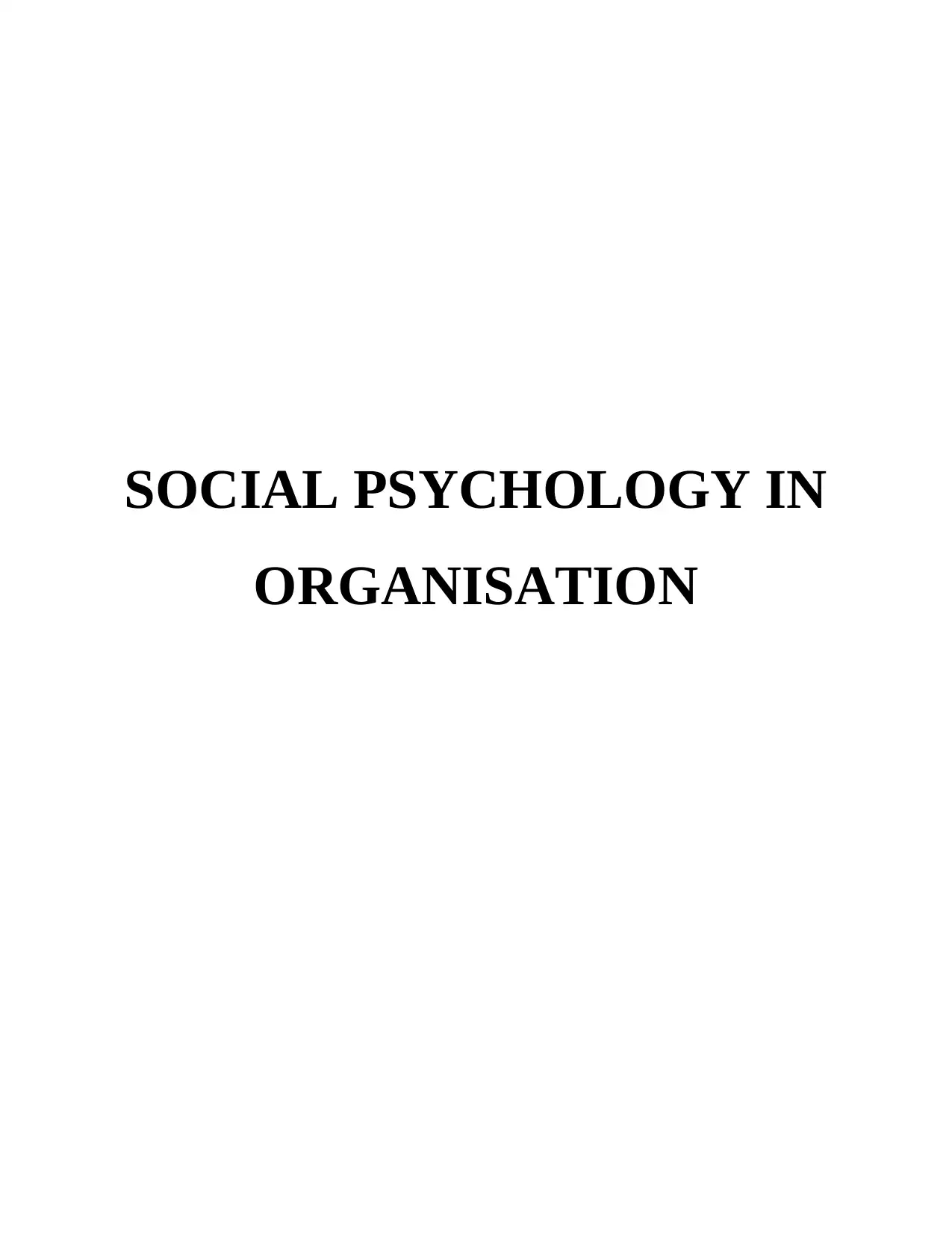
SOCIAL PSYCHOLOGY IN
ORGANISATION
ORGANISATION
Paraphrase This Document
Need a fresh take? Get an instant paraphrase of this document with our AI Paraphraser
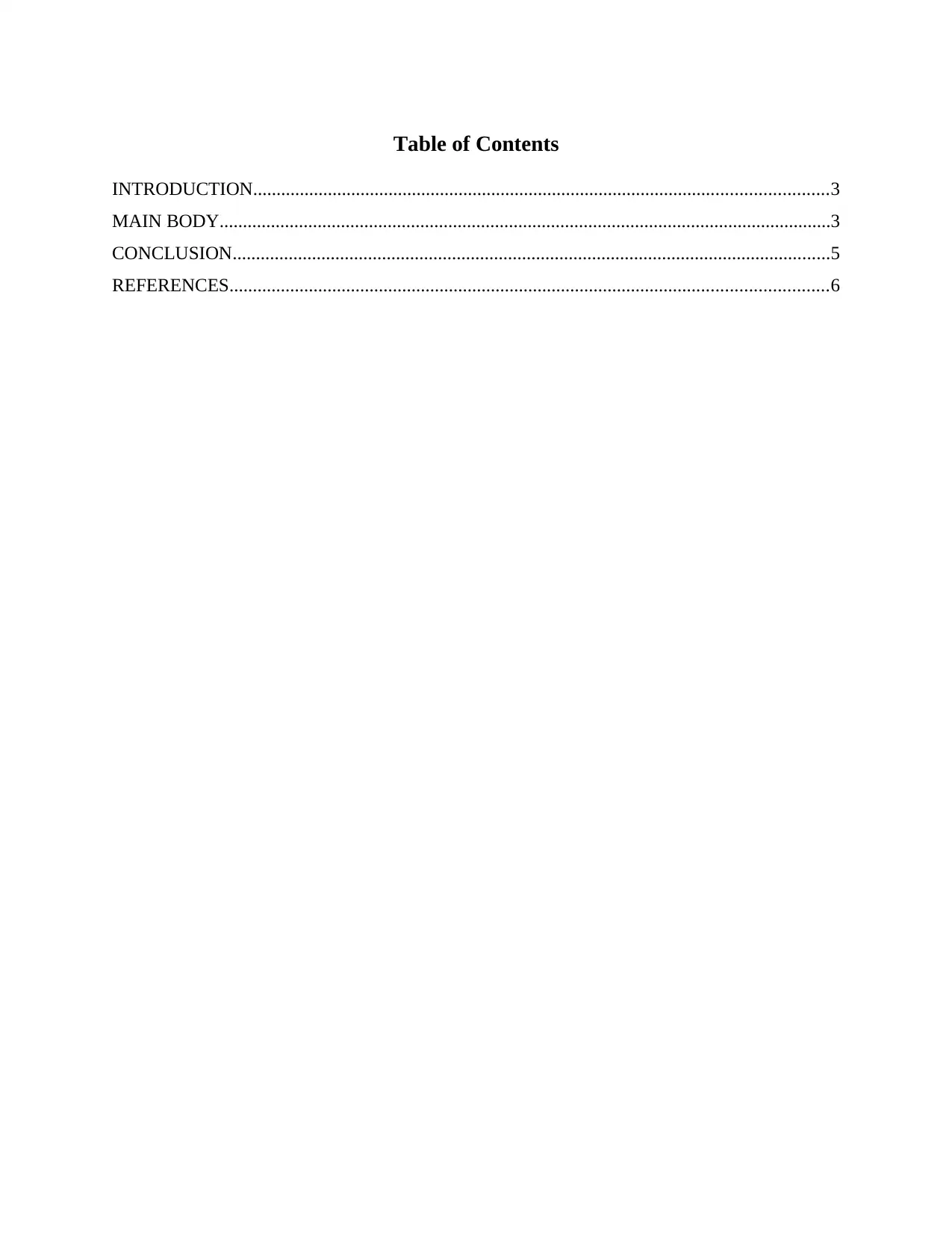
Table of Contents
INTRODUCTION...........................................................................................................................3
MAIN BODY...................................................................................................................................3
CONCLUSION................................................................................................................................5
REFERENCES................................................................................................................................6
INTRODUCTION...........................................................................................................................3
MAIN BODY...................................................................................................................................3
CONCLUSION................................................................................................................................5
REFERENCES................................................................................................................................6
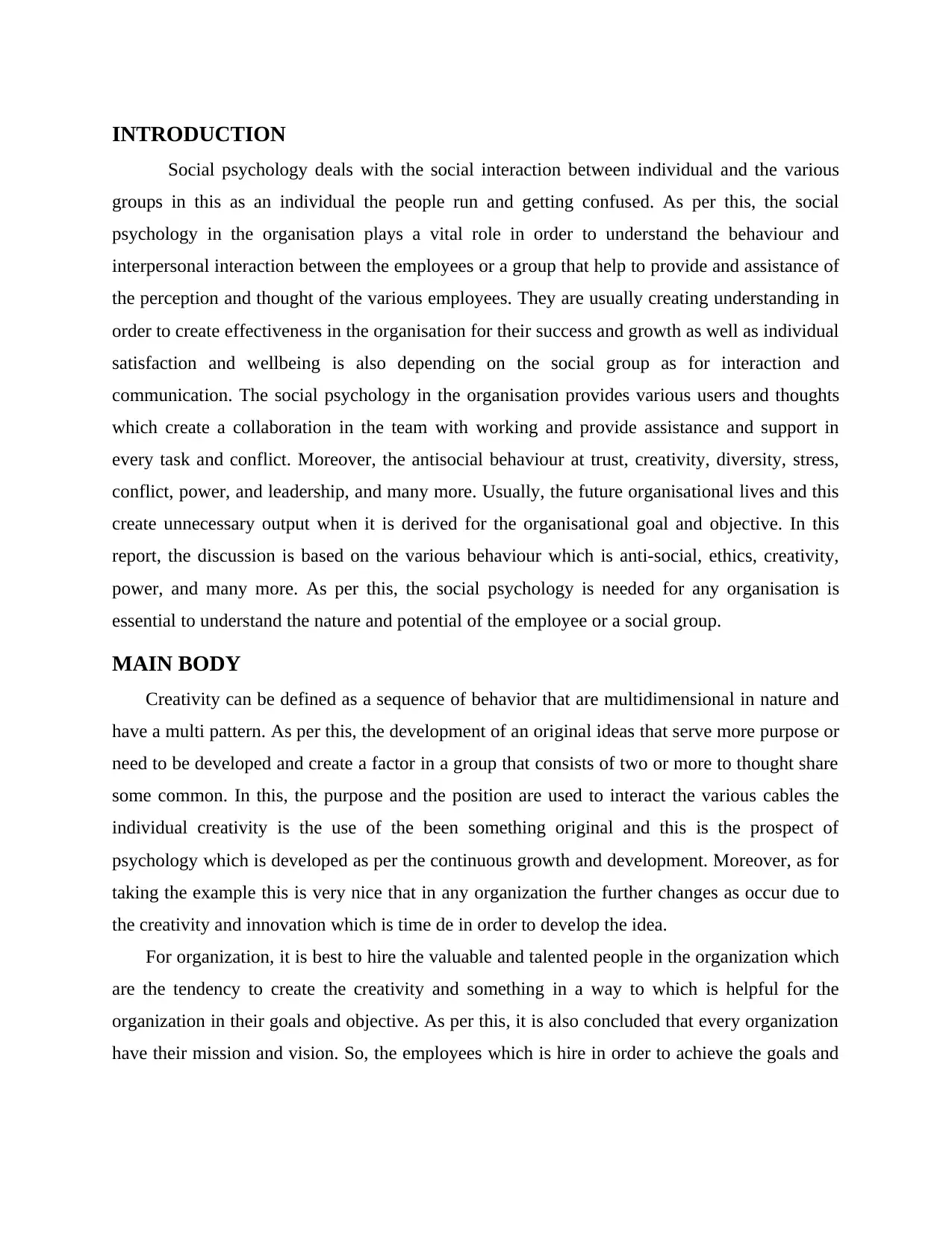
INTRODUCTION
Social psychology deals with the social interaction between individual and the various
groups in this as an individual the people run and getting confused. As per this, the social
psychology in the organisation plays a vital role in order to understand the behaviour and
interpersonal interaction between the employees or a group that help to provide and assistance of
the perception and thought of the various employees. They are usually creating understanding in
order to create effectiveness in the organisation for their success and growth as well as individual
satisfaction and wellbeing is also depending on the social group as for interaction and
communication. The social psychology in the organisation provides various users and thoughts
which create a collaboration in the team with working and provide assistance and support in
every task and conflict. Moreover, the antisocial behaviour at trust, creativity, diversity, stress,
conflict, power, and leadership, and many more. Usually, the future organisational lives and this
create unnecessary output when it is derived for the organisational goal and objective. In this
report, the discussion is based on the various behaviour which is anti-social, ethics, creativity,
power, and many more. As per this, the social psychology is needed for any organisation is
essential to understand the nature and potential of the employee or a social group.
MAIN BODY
Creativity can be defined as a sequence of behavior that are multidimensional in nature and
have a multi pattern. As per this, the development of an original ideas that serve more purpose or
need to be developed and create a factor in a group that consists of two or more to thought share
some common. In this, the purpose and the position are used to interact the various cables the
individual creativity is the use of the been something original and this is the prospect of
psychology which is developed as per the continuous growth and development. Moreover, as for
taking the example this is very nice that in any organization the further changes as occur due to
the creativity and innovation which is time de in order to develop the idea.
For organization, it is best to hire the valuable and talented people in the organization which
are the tendency to create the creativity and something in a way to which is helpful for the
organization in their goals and objective. As per this, it is also concluded that every organization
have their mission and vision. So, the employees which is hire in order to achieve the goals and
Social psychology deals with the social interaction between individual and the various
groups in this as an individual the people run and getting confused. As per this, the social
psychology in the organisation plays a vital role in order to understand the behaviour and
interpersonal interaction between the employees or a group that help to provide and assistance of
the perception and thought of the various employees. They are usually creating understanding in
order to create effectiveness in the organisation for their success and growth as well as individual
satisfaction and wellbeing is also depending on the social group as for interaction and
communication. The social psychology in the organisation provides various users and thoughts
which create a collaboration in the team with working and provide assistance and support in
every task and conflict. Moreover, the antisocial behaviour at trust, creativity, diversity, stress,
conflict, power, and leadership, and many more. Usually, the future organisational lives and this
create unnecessary output when it is derived for the organisational goal and objective. In this
report, the discussion is based on the various behaviour which is anti-social, ethics, creativity,
power, and many more. As per this, the social psychology is needed for any organisation is
essential to understand the nature and potential of the employee or a social group.
MAIN BODY
Creativity can be defined as a sequence of behavior that are multidimensional in nature and
have a multi pattern. As per this, the development of an original ideas that serve more purpose or
need to be developed and create a factor in a group that consists of two or more to thought share
some common. In this, the purpose and the position are used to interact the various cables the
individual creativity is the use of the been something original and this is the prospect of
psychology which is developed as per the continuous growth and development. Moreover, as for
taking the example this is very nice that in any organization the further changes as occur due to
the creativity and innovation which is time de in order to develop the idea.
For organization, it is best to hire the valuable and talented people in the organization which
are the tendency to create the creativity and something in a way to which is helpful for the
organization in their goals and objective. As per this, it is also concluded that every organization
have their mission and vision. So, the employees which is hire in order to achieve the goals and
⊘ This is a preview!⊘
Do you want full access?
Subscribe today to unlock all pages.

Trusted by 1+ million students worldwide
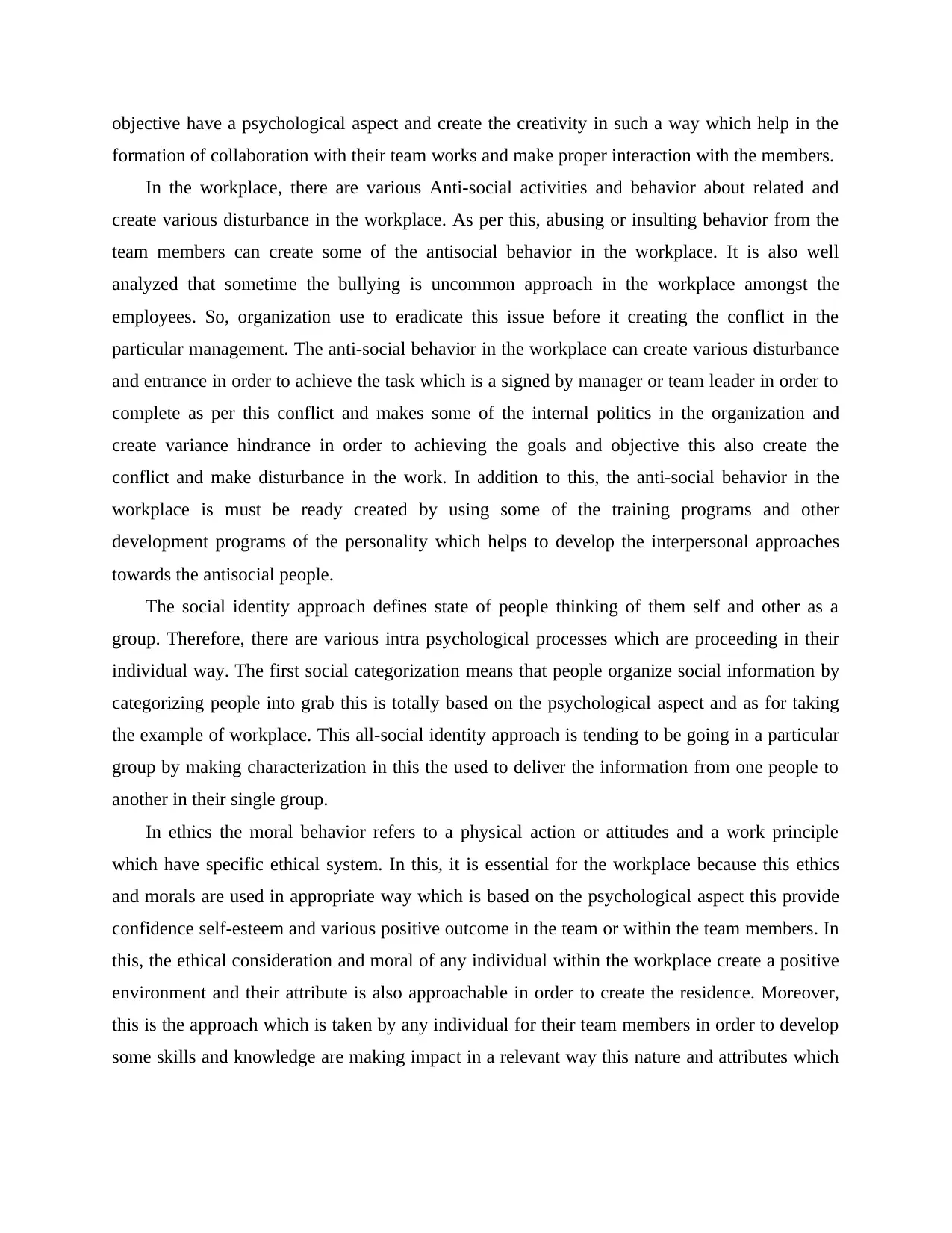
objective have a psychological aspect and create the creativity in such a way which help in the
formation of collaboration with their team works and make proper interaction with the members.
In the workplace, there are various Anti-social activities and behavior about related and
create various disturbance in the workplace. As per this, abusing or insulting behavior from the
team members can create some of the antisocial behavior in the workplace. It is also well
analyzed that sometime the bullying is uncommon approach in the workplace amongst the
employees. So, organization use to eradicate this issue before it creating the conflict in the
particular management. The anti-social behavior in the workplace can create various disturbance
and entrance in order to achieve the task which is a signed by manager or team leader in order to
complete as per this conflict and makes some of the internal politics in the organization and
create variance hindrance in order to achieving the goals and objective this also create the
conflict and make disturbance in the work. In addition to this, the anti-social behavior in the
workplace is must be ready created by using some of the training programs and other
development programs of the personality which helps to develop the interpersonal approaches
towards the antisocial people.
The social identity approach defines state of people thinking of them self and other as a
group. Therefore, there are various intra psychological processes which are proceeding in their
individual way. The first social categorization means that people organize social information by
categorizing people into grab this is totally based on the psychological aspect and as for taking
the example of workplace. This all-social identity approach is tending to be going in a particular
group by making characterization in this the used to deliver the information from one people to
another in their single group.
In ethics the moral behavior refers to a physical action or attitudes and a work principle
which have specific ethical system. In this, it is essential for the workplace because this ethics
and morals are used in appropriate way which is based on the psychological aspect this provide
confidence self-esteem and various positive outcome in the team or within the team members. In
this, the ethical consideration and moral of any individual within the workplace create a positive
environment and their attribute is also approachable in order to create the residence. Moreover,
this is the approach which is taken by any individual for their team members in order to develop
some skills and knowledge are making impact in a relevant way this nature and attributes which
formation of collaboration with their team works and make proper interaction with the members.
In the workplace, there are various Anti-social activities and behavior about related and
create various disturbance in the workplace. As per this, abusing or insulting behavior from the
team members can create some of the antisocial behavior in the workplace. It is also well
analyzed that sometime the bullying is uncommon approach in the workplace amongst the
employees. So, organization use to eradicate this issue before it creating the conflict in the
particular management. The anti-social behavior in the workplace can create various disturbance
and entrance in order to achieve the task which is a signed by manager or team leader in order to
complete as per this conflict and makes some of the internal politics in the organization and
create variance hindrance in order to achieving the goals and objective this also create the
conflict and make disturbance in the work. In addition to this, the anti-social behavior in the
workplace is must be ready created by using some of the training programs and other
development programs of the personality which helps to develop the interpersonal approaches
towards the antisocial people.
The social identity approach defines state of people thinking of them self and other as a
group. Therefore, there are various intra psychological processes which are proceeding in their
individual way. The first social categorization means that people organize social information by
categorizing people into grab this is totally based on the psychological aspect and as for taking
the example of workplace. This all-social identity approach is tending to be going in a particular
group by making characterization in this the used to deliver the information from one people to
another in their single group.
In ethics the moral behavior refers to a physical action or attitudes and a work principle
which have specific ethical system. In this, it is essential for the workplace because this ethics
and morals are used in appropriate way which is based on the psychological aspect this provide
confidence self-esteem and various positive outcome in the team or within the team members. In
this, the ethical consideration and moral of any individual within the workplace create a positive
environment and their attribute is also approachable in order to create the residence. Moreover,
this is the approach which is taken by any individual for their team members in order to develop
some skills and knowledge are making impact in a relevant way this nature and attributes which
Paraphrase This Document
Need a fresh take? Get an instant paraphrase of this document with our AI Paraphraser
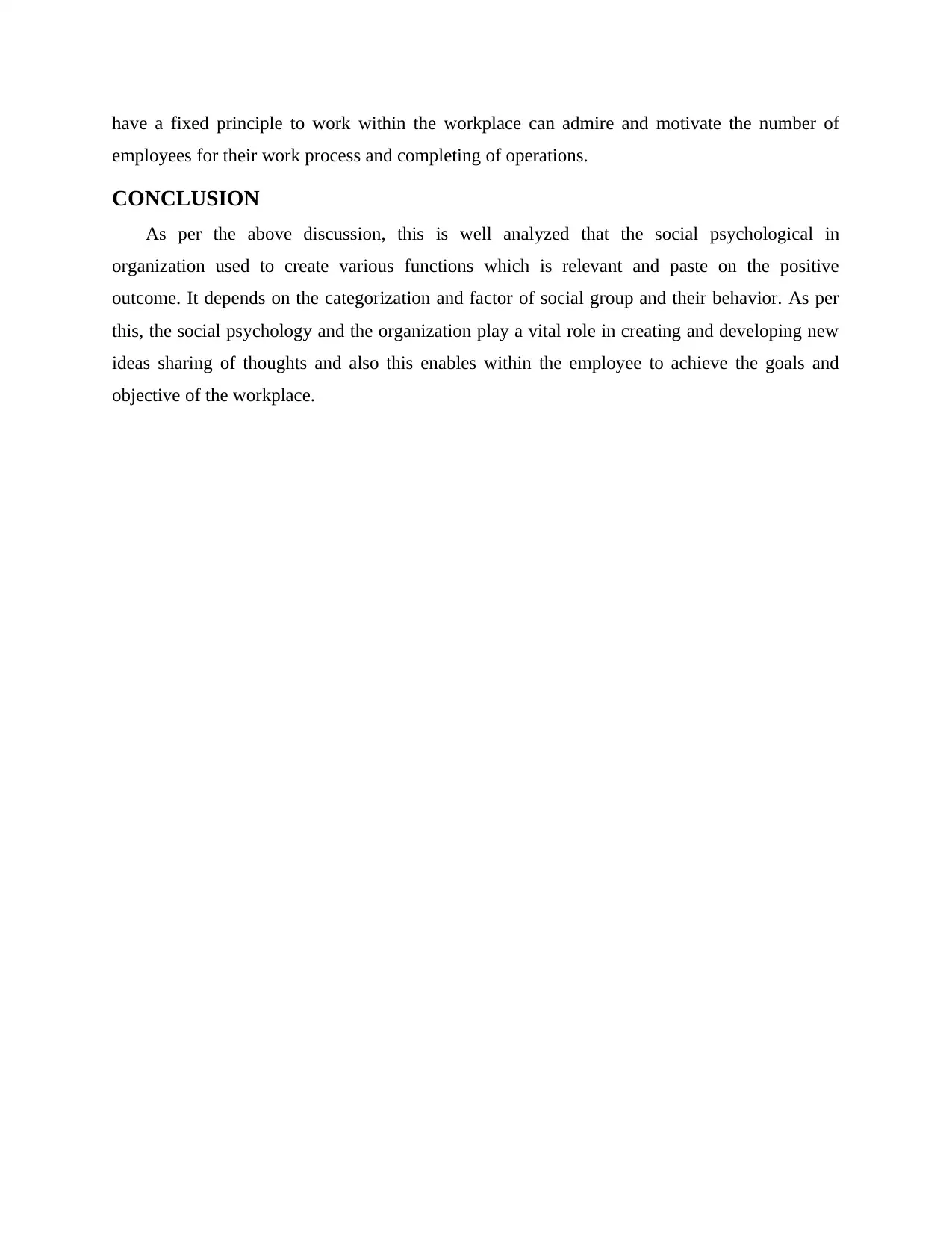
have a fixed principle to work within the workplace can admire and motivate the number of
employees for their work process and completing of operations.
CONCLUSION
As per the above discussion, this is well analyzed that the social psychological in
organization used to create various functions which is relevant and paste on the positive
outcome. It depends on the categorization and factor of social group and their behavior. As per
this, the social psychology and the organization play a vital role in creating and developing new
ideas sharing of thoughts and also this enables within the employee to achieve the goals and
objective of the workplace.
employees for their work process and completing of operations.
CONCLUSION
As per the above discussion, this is well analyzed that the social psychological in
organization used to create various functions which is relevant and paste on the positive
outcome. It depends on the categorization and factor of social group and their behavior. As per
this, the social psychology and the organization play a vital role in creating and developing new
ideas sharing of thoughts and also this enables within the employee to achieve the goals and
objective of the workplace.
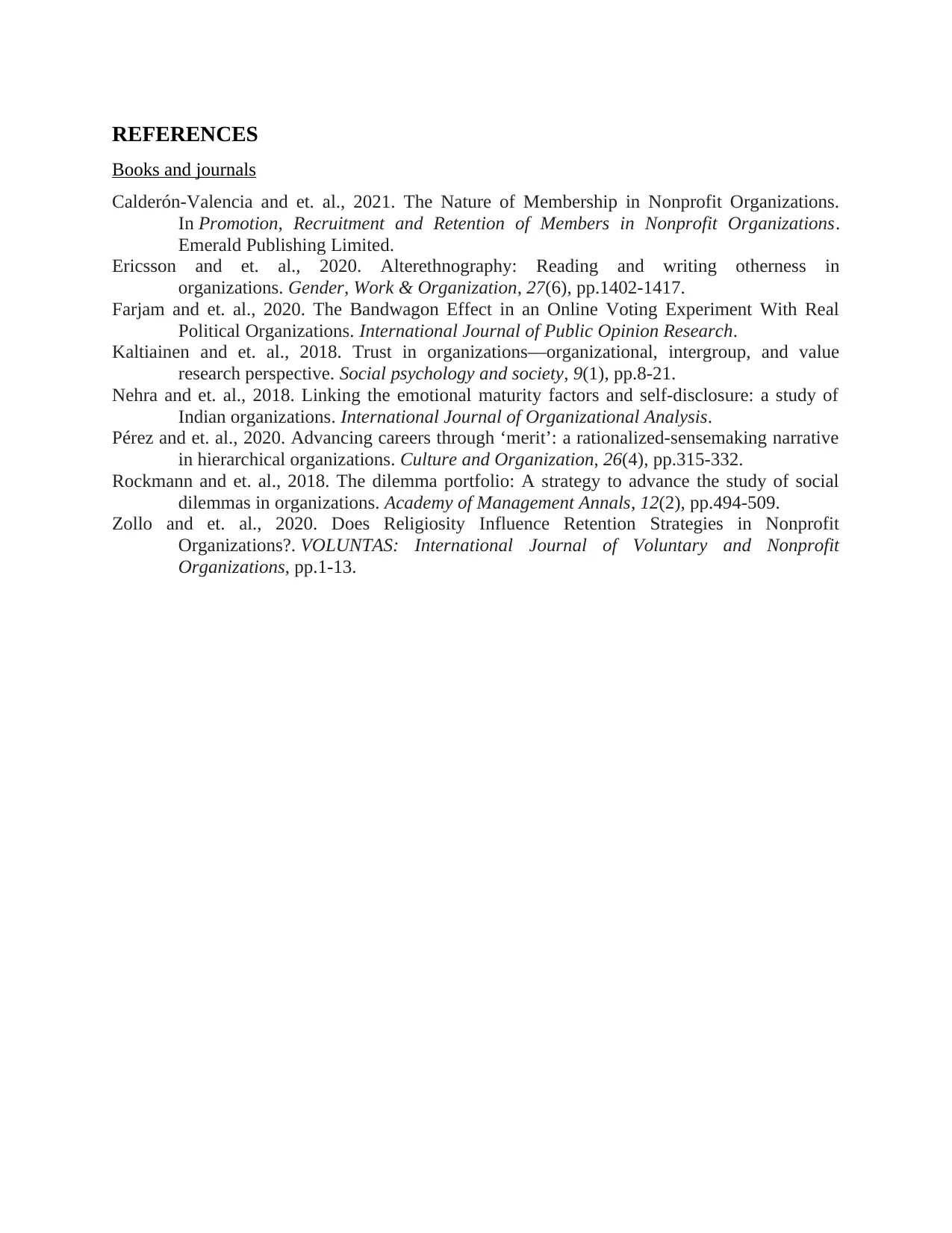
REFERENCES
Books and journals
Calderón-Valencia and et. al., 2021. The Nature of Membership in Nonprofit Organizations.
In Promotion, Recruitment and Retention of Members in Nonprofit Organizations.
Emerald Publishing Limited.
Ericsson and et. al., 2020. Alterethnography: Reading and writing otherness in
organizations. Gender, Work & Organization, 27(6), pp.1402-1417.
Farjam and et. al., 2020. The Bandwagon Effect in an Online Voting Experiment With Real
Political Organizations. International Journal of Public Opinion Research.
Kaltiainen and et. al., 2018. Trust in organizations—organizational, intergroup, and value
research perspective. Social psychology and society, 9(1), pp.8-21.
Nehra and et. al., 2018. Linking the emotional maturity factors and self-disclosure: a study of
Indian organizations. International Journal of Organizational Analysis.
Pérez and et. al., 2020. Advancing careers through ‘merit’: a rationalized-sensemaking narrative
in hierarchical organizations. Culture and Organization, 26(4), pp.315-332.
Rockmann and et. al., 2018. The dilemma portfolio: A strategy to advance the study of social
dilemmas in organizations. Academy of Management Annals, 12(2), pp.494-509.
Zollo and et. al., 2020. Does Religiosity Influence Retention Strategies in Nonprofit
Organizations?. VOLUNTAS: International Journal of Voluntary and Nonprofit
Organizations, pp.1-13.
Books and journals
Calderón-Valencia and et. al., 2021. The Nature of Membership in Nonprofit Organizations.
In Promotion, Recruitment and Retention of Members in Nonprofit Organizations.
Emerald Publishing Limited.
Ericsson and et. al., 2020. Alterethnography: Reading and writing otherness in
organizations. Gender, Work & Organization, 27(6), pp.1402-1417.
Farjam and et. al., 2020. The Bandwagon Effect in an Online Voting Experiment With Real
Political Organizations. International Journal of Public Opinion Research.
Kaltiainen and et. al., 2018. Trust in organizations—organizational, intergroup, and value
research perspective. Social psychology and society, 9(1), pp.8-21.
Nehra and et. al., 2018. Linking the emotional maturity factors and self-disclosure: a study of
Indian organizations. International Journal of Organizational Analysis.
Pérez and et. al., 2020. Advancing careers through ‘merit’: a rationalized-sensemaking narrative
in hierarchical organizations. Culture and Organization, 26(4), pp.315-332.
Rockmann and et. al., 2018. The dilemma portfolio: A strategy to advance the study of social
dilemmas in organizations. Academy of Management Annals, 12(2), pp.494-509.
Zollo and et. al., 2020. Does Religiosity Influence Retention Strategies in Nonprofit
Organizations?. VOLUNTAS: International Journal of Voluntary and Nonprofit
Organizations, pp.1-13.
⊘ This is a preview!⊘
Do you want full access?
Subscribe today to unlock all pages.

Trusted by 1+ million students worldwide
1 out of 6
Related Documents
Your All-in-One AI-Powered Toolkit for Academic Success.
+13062052269
info@desklib.com
Available 24*7 on WhatsApp / Email
![[object Object]](/_next/static/media/star-bottom.7253800d.svg)
Unlock your academic potential
Copyright © 2020–2025 A2Z Services. All Rights Reserved. Developed and managed by ZUCOL.





